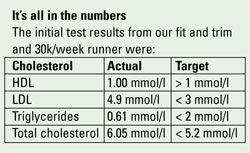You hear it all the time and everywhere you go — eat healthily and get fit. Then you hear that little voice in your head telling you to lose weight, go on a detox or get to the gym class! Yet, you do nothing until you get the results back from your blood test revealing high cholesterol. It’s a wake-up call and then and only then, you begin to take charge of matters, as we discovers.
Controlling cholesterol is a serious undertaking requiring diligence and perseverance. We took a morning jog with the Saar Social Runners and met with the experts to find out more about this symptomless condition that can sneak up on you if you don’t get checked and make changes!
Wake-up!
Let’s not mince words, high cholesterol, is indeed as scary as it sounds. Left untreated, it can lead to heart disease and stroke. Globally, high cholesterol is responsible for a third of heart disease according to the World Health Organization.
The problem is prevalent in the Middle East and here in Bahrain where our sedentary lifestyles and diets laden with processed foods and animal fats lead to such coronary problems. Take heart — a visit to your doctor followed by a simple blood test gives you all the information you need to know about your cholesterol levels.
The good and bad
 Cholesterol is a fatty substance in our body produced by the liver but also found in animal products. Despite the scare factor cholesterol does have some redeeming qualities. In fact, we cannot live without it.
Cholesterol is a fatty substance in our body produced by the liver but also found in animal products. Despite the scare factor cholesterol does have some redeeming qualities. In fact, we cannot live without it.
Cholesterol serves an important role in the body to produce cell membranes, some hormones, making vitamin D and aid in the production bile. The problem is in cholesterol’s dual personality.
On the one side there is good cholesterol (HDL or High-density lipoprotein) and on the other is a bad one (LDL or Low-density lipoprotein). The trick is to raise the good and decrease the bad which is somewhat harder than it sounds.
“I was shocked to find out I had high cholesterol two years ago,” says one runner from the Saar Social Runners, who averages 30 km of running per week. The fit and trim mother of three says she honestly felt she had a balanced lifestyle.
However, after closer inspection she realised there were many ways to tweak her diet to bring down the numbers. Diet is indeed one of the ways of controlling cholesterol but other lifestyle factors such as smoking, stress and alcohol consumption as well as genetics can be at play with elevated cholesterol levels.
CONTROL YOUR CHOLESTEROL
Our expert: Dr Syed Raza, cardiologist,
Awali Hospital
Although Dr Raza does see his fair share of patients with high cholesterol he says there are still many people walking around with high cholesterol who don’t know it. “What I am seeing in Bahrain is the tip of the iceberg due to lack of screening,” says the cardiologist.
Our Saar Social Runner mother says she only decided to include a blood test in her annual smear test because this was routine procedure in her home country. Dr Raza suggests individuals should check their cholesterol from the age of 35 onwards and every one to two years after if the results are normal.
What the doctor is looking for in the screening test is not only the total cholesterol but the breakdown of the HDL, LDL and triglycerides, another type of fat found in the blood which can be elevated due to a poor diet.
“In the past we used to only look at the total cholesterol. Now we are more concerned about the LDL or the bad cholesterol,” explains the cardiologist.
Dr Raza says his patients tend to take the issue of high cholesterol more seriously when he points out that ignoring the problem will lead to an increased risk of heart attack or stroke.
“They are then more motivated to change their diet or if they have stopped taking their medication, then they go back on it.”
Two months is the time he suggests to make dietary changes to see if this is the culprit behind high cholesterol. Patients work with the hospital’s dietician to find a suitable programme. “Even then, only about fifty percent of individuals will change their lifestyle,” says Dr Raza.
If the high cholesterol numbers persist, the patient has made dietary changes and other factors are ruled out such as diabetes, thyroid problems or medication then that normally suggests the cause is related to genetics. High cholesterol for this reason accounts for approximately 30 per cent of the cases in this region. If genetics are not the cause of high cholesterol and the patient does not make the necessary lifestyle changes, then cholesterol-reducing medication may be necessary.
Awali Hospital is spearheading a programme about the importance of screening for cholesterol and to raise awareness about other issues such as high blood pressure, diabetes and obesity.
“We have already done some work with BAPCO employees and plan to bring the programme to the general public in the next few months,” says Dr Raza.
Dr Raza cautions women to pay close attention to their cholesterol levels before and after menopause. Before menopause, studies have shown women generally have more good cholesterol than their male counterparts. However, there is a tendency for this number to drop and for the bad cholesterol to rise after menopause.
He advises women to exercise more, eat a diet rich in omega fatty acids, quit smoking and if you drink alcohol, be aware of the recommended daily allowance.
EAT RIGHT
Our expert: Alia Almoayed, Nutritional Therapist
 If you want to control cholesterol then what you eat is essential. It comes as little surprise then that our nutritional expert
If you want to control cholesterol then what you eat is essential. It comes as little surprise then that our nutritional expert
Alia Almoayed has been busy advising her clients in Bahrain on how to reduce their high cholesterol.
“People think it is difficult to eat healthy,” says Alia. “So I ask, is it more difficult than being sick? Is it more difficult than going to the hospital, more difficult than getting a terminal illness?” The answers should be easy if you want to be heart smart.
If you know you can control your cholesterol then do it. “Elevated cholesterol is your body’s way of telling you that it is not happy. Pay attention and start doing something about it,” advises Alia.
Action 1: Lower saturated fats Alia recommends lowering your fat intake and limiting all foods from animal sources. Trans fats or hydrogenated vegetable oils often found in processed foods should also be avoided. Cut out dairy and if you do eat meat, use low fat varieties and remove the skin from chicken. Broiling and steaming are better choices than frying.
Action 2: Eat oily fish Omega fatty acids (3,6,9) from raw nuts, seeds, fish and supplements are also vital to good heart health. Good fish choices are herring, mackerel or salmon.
Action 3: More fibre A heart smart diet includes lots of soluble fibre, like oats, beans, fruits, vegetables, legumes and whole grain cereals and breads.
Action 4: Manage stress While changing your diet is a common mantra when it comes to lowering cholesterol, Alia suggests it is just as important to find ways of managing stress.
Indeed, our Saar Social Runner mother reveals she wasn’t great at handling stress and knew that this was probably contributing to her elevated numbers. “I started to realise what was important in my life and focus on this rather than so many mundane worries that never actually happen,” she says.
Action 5: Exercise regularly Studies show exercise increases good cholesterol and helps maintain an ideal body weight. Our bodies were not designed to sit in front of a computer or TV every day. Get moving! Whatever you choose to do, do it regularly!
Action 6: Take a multivitamin Alia recommends a good quality daily multi-vitamin supplement. “I believe that it’s difficult in this day and age to get everything we need from the diet alone because of pollution, deficient soil, early harvest, and many more things,” she notes.
What we know from research on the cholesterol is that, if your high cholesterol is not genetic, then you do have control over this condition. You do have the power to change your lifestyle, diet and manage stress. So why aren’t we listening?
 Alia suggests people only listen when they have a health problem. Our Saar Social Runner mother adds that many people ask her why she had her cholesterol checked when she was seemingly healthy. The answer is simply that you cannot ‘see’ cholesterol.
Alia suggests people only listen when they have a health problem. Our Saar Social Runner mother adds that many people ask her why she had her cholesterol checked when she was seemingly healthy. The answer is simply that you cannot ‘see’ cholesterol.
Through education and initiatives, such as Awali Hospital’s heart smart programme, perhaps more people will take control over their cholesterol and have it checked.
“With more awareness campaigns, we are trying to teach people that healthy eating can be delicious. Most importantly, you can incorporate it into your daily life without making any major sacrifices,” Alia adds.





































